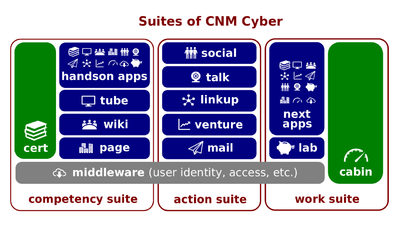What Requirements Are
What Requirements Are (hereinafter, the Lectio) is the lesson part of the Digital Transformations lesson that introduces its participants to the development of CNMCyber. This lesson belongs to the CNMC for Experience session of EmployableU Concepts.
Contents
Content
The predecessor lectio is What the DevOps Is.
Script
- The requirements the documents that represent the visions of what needs to be developed. Creation of requirements is neither an easy nor straightforward process.
- Initially, CNMCyber Team creates product epics. At CNMCyber, they are the wikipages that describe the new deliverables that need to be developed. The product epics' category lists of the available epics.
- These product epics are helpful to clarify the vision of new deliverables, but they are rarely clear or specific for developers to implement and not useful for CNMCyber Team to accept developers' work.
- To make the epics usable for the product developers, these epics are chunked in user stories. Every story represents one function or feature and is written from the point of view of an end-user. To create the stories, CNMCyber Team uses a simple format,
In order to ..., as a ..., I need to .... For instance,In order to develop user stories, as CNMCyber Team member, I need to know their format.
- For the developers, these stories indicate what needs to be developed. More thorough requirements specifications indicate the rest what the developers need to know. Those specifications include what rules and regulations exist, how the developers shall submit their works, etc. At CNMCyber, one specification, CNMCyber requirements, clarifies the overall requirements for the CNMCyber development, while another, CNM Cloud requirements, does so for the Opplet one.
- All of those requirements are created at CNM Wiki to be open to the general public. This policy serves two purposes.
- First, CNMCyber Team can solicit better feedback in that way.
- Second, even pre-entry-level developers can see the complete development process 24 hours a day and 7 days a week.
- Having a variety of documents may create some confusions if some documents contradict each other. The concept of single source of truth (SSOT) aims to solve that challenge. Product epics are drafted at CNM Wiki, but their approved versions are published on CNM Page.
Key terms
- Requirement, product epic, user story, requirements specification, CNMCyber requirements, CNM Cloud requirements, single source of truth (SSOT), document
Closing
- Are you interested in working on requirements for CNMCyber? --Yes/No/I'm not sure
What the Workforce Is is the successor lectio.
Questions
Placement entrance exam
True/False questions
- In comparison with user stories, product epics are more clear for developers work.
- To make usable for developers ,product epics are chunked in user stories.
- A user story is (not) written from the point of view of developer.
- A user story is (not) written from the point of view of end-user.
- A product epic is (not) written from the point of view of developer.
- A product epic is (not) written from the point of view of end user.
- user stories are chunked in product epics.
- Every user story (does not) represents one function or feature.
- Every product epic (does not) represents one function or feature.
- In order to ..., as a ..., I need to .... are some phrases used to write user stories at CNMCyber.
- In order to ..., as a ..., I need to .... are some phrases used to write product epics at CNMCyber.
- Requirement specifications have thorough information for developers.
- Requirement specifications (do not) include rules and regulations and how the developers shall submit their works, etc.
